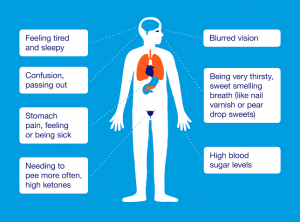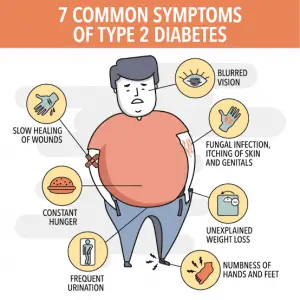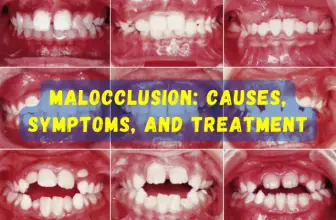Can You Die From Diabetes Type 1

All of you have heard that diabetes will shorten the expected life of the concerned patient. But, how much? To know it, We will deep dive into the various issues that lead the diabetic patient to death.
Diabetes seems like you are going to die as soon as you hear it. After the diagnosis, your human nature will push you to know, about your life expectancy. The very first thing that will give you goosebumps is that: Can you die from diabetes type 1? Conversely, can you die from diabetes type 2?
Well, these questions have no hard and fast answer. As there is a number of factors that influence one’s life expectancy. Whether you have type1 or type 2 diabetes the contributing factors are mainly two. They are: how fast you get diagnosed & the further progress of diabetic complications.
Type 1 Diabetes: What Are The Symptoms?
Diabetes type 1 is a chronic condition. That starts usually in childhood but can occur in adults too. In the case of type 1 diabetes, the pancreas produces insulin very low in amount. But this insulin hormone helps the cells in the body to convert sugar into energy.
So, the failure of your pancreas to produce enough insulin may start to build up sugar in the blood. That ultimately results in life-threatening complications. People having type 1 diabetes, must need to take some form of insulin for the rest of their life.
Buy Sugar Balance Supplement For as Low as $33/Bottle. Lowest Price Online. Huge Savings. Improve Your Metabolism and Regulate Healthy Sugar Levels. All Natural. No Side Effects. 180 Days Money-Back Guarantee.
Unusual thirst symptoms
The most common symptoms of type 1 diabetes are unusual thirst symptoms. It occurs when sugar builds up in your blood, your kidneys work overtime to get rid of it. This takes fluid from your tissues and makes you dehydrated. And this dehydration provokes you to drink more water.

Image source: ND TV food.com
Weight loss symptoms
The term “unintentional weight loss” goes with diabetes type 1 very well. In this case, you lose sugar by peeing a lot. Many calories also leave with the massive urination causes weight loss.No matter whatever you are eating, you might lose weight.

Image source: Daily express. Com
Skin Problems Symptoms
In type 1 diabetes, disruption in glucose metabolism takes place. Hence, they develop skin problems. Mostly They get infected by bacterial and fungal attacks. Also, this high blood sugar can slow your blood flow. That really makes it harder for your body to heal.
Ketoacidosis Symptoms
The cells of the body of people with diabetes type 1 are deprived of sugar. As sugar needs insulin, produced by the pancreas, to enter into the body’s cells. For this, the body cells burn fat for their energy. But this process causes ketones to build up in the blood, which is toxic.

Image source: diabetes UK. Com
Excess of acids then alters the blood pH of the persons. This condition also triggers a life-threatening coma termed as ” Diabetic ketoacidosis “. This one is a serious medical emergency that needs to treat quickly. The following symptoms are responsible for diabetic ketoacidosis.
What Causes a Shorter Lifespan for Diabetes Patients?
Leaving your diabetes uncontrolled may give rise to blood sugars over a period of time. That allows diabetic complications to set in. It is responsible for damaging blood vessels, also nerves causing poor circulation and functioning of vital organs. Vital organs like heart, kidney, eyes are developing to complications. Such as :
- heart attack
- kidney disease
- blindness
These conditions also accompanied by high blood pressure & cholesterol, which further damages the organ systems. There are some short-term complications which also regarded as fatal. They are :
- hypoglycemia & diabetic ketoacidosis.
What about the signs of end-of-life due to diabetes?
Signs of dying from diabetes are divided into two categories. They are high and low blood glucose level. Because they can lead you to some life-threatening complications. Carefully read the following signs:
- using the bathroom frequently
- increased drowsiness
- infections
- increased thirst
- increased hunger
- itching
- weight loss
- fatigue
- numbness in fingers/toes
- wounds that are slow to heal
these are the signs of high blood glucose levels.
Again, signs of low blood glucose include:
- Feeling irritable or anxious
- Trembling and sweating
- Paleness
- Palpitations
- Blurred vision
- Sweating
If you find out any of the end-of-life diabetes signs, without any delay, you should consult your doctor.
Your Blood Pressure Will Begin to Normalize Permanently in just a Few Days From Now. Achieve Your Blood Pressure Reduction Goals Without The Risk of Adverse Side Effects. Try Risk-Free for 60 Days!
The Longevity of Individuals Living with Type 1 diabetes:
People who are diagnosed with type 1 in youth, live with this condition for a longer period. If you compare them with people having type 2 diabetes. They mainly reliance on insulin supplementation. Type 1 diabetes is extremely complex. Especially, difficult to manage with anxiety to deliver the right amount of insulin at the right time of day.
Studies regarding type 1 diabetes life expectancy:
The Journal of American Medical Association (JAMA) published a report that men with type 1 diabetes have a shortened lifespan of 11 years than normal men. On the other hand, Women with the condition have their lives cut short by 13 years. They also added that the impact on heart health appears to be one of the leading causes of this.
Poorly controlled type 1 diabetes life expectancy:
This mainly depends on two things.
1. Is the person diagnosed with diabetes newly? In that case, there retains some insulin production. This insulin can provide back up for months or even years.
What happens in such cases? In this honeymoon phage, they may be still able to produce 10-20% insulin-like normal persons. With this, they could survive for years radically reducing their carb intake & regular exercise. But as soon as the insulin begins to droop, they might develop some greater complications that continue until they die.
2. Maybe the person is aware of the fact that he/she is out of insulin. As there are some methods to mitigate insulin.
If they are aware that they are producing zero insulin, they will immediately stop taking carb. Then, they will start to drink an excessive amount of water & also begin exercising. This exercise will help to maintain the sugar level in blood.
On the other hand, Excessive water will flush ketones out of the body. But by doing all this they only can extend the amount of time to fall in DKA but can’t stave off death forever. Ultimately they fall into DKA and die.
Can you die from diabetes type 1?
As I mentioned above that there cannot be a sure shot answer to the question. After searching a lot, I have found some factors that will determine the life expectancy of a diabetic patient.
Factors include :
- The time period at which the patient has been diagnosed with diabetes. It is important because some people die at an earlier age. But, due to no diagnosis, their reason for death remains unknown.
- Reachers found that early diagnosis is good as these patients aware of the fact of taking insulin. They are also able to control his or her blood glucose and sugar levels.
- Reachers have found the biggest factor in life expectancy is heart diseases. But people dying under the age of fifty more likely to suffer from a diabetic coma.
But the good news is with the early diagnosis & proper care people also overcome the problem. If you are already frustrated by finding all these things, then this one will give you some hope.
Do you hear about, Winsome Johnston, the world’s oldest person with type1 diabetes! An astonishing fact is, she has had Type 1 for 78 years, was diagnosed when she was just six years old.
What are the causes that can lead to deaths in type 1 diabetes?
Dead in Bed syndrome: this term is used to describe the sudden unexplained deaths of young people with type 1 diabetes. It occurs usually due to an episode of extremely low blood pressure while asleep and which often leads to death.
Cardiovascular complication: A statement from the American Heart Association and American Diabetes Association was published a few years ago. They stated that the pathophysiology underlying the relationship between cardiovascular events, CVD risk factors, and T1DM is not well understood.
Therefore, the Diabetes Control and Complications Trial (DCCT) found some way to control them. They found that intensive glycemic control with usual care, and its follow-up observational study, become the standard of care. This will lead to increased longevity. Kidney damage could be another reason of death in type 1 diabetes.
Buy Sugar Balance Supplement For as Low as $33/Bottle. Lowest Price Online. Huge Savings. Improve Your Metabolism and Regulate Healthy Sugar Levels. All Natural. No Side Effects. 180 Days Money-Back Guarantee.
Type 2 Diabetes: What Are The Symptoms?
What is type 2 diabetes?
Type 2 diabetes or adult-onset diabetes is characterized by high levels of sugar in the blood. This diabetes starts almost always in the middle- and late adulthood.
In type 2 diabetes, your body’s cells resist the normal effect of insulin. Consequently, sugar starts to build up in the blood. In response to it, the pancreas produces extra insulin to maintain normal blood sugar. But again insulin resistance develops and the situation deteriorates soon.
It occurs when your body’s cells resist the normal effect of insulin. This condition is called insulin resistance. As a result, glucose starts to build up in the blood. Soon your pancreas gets “exhausted”. It becomes unable to keep up with the demand for more and more insulin. So, blood sugar rises to its pick.
Type 2 Diabetes Symptoms :
Symptoms of type 2 diabetes appear slowly than type 1. Similarities of sign-symptoms are found between type 1 & type 2 diabetes. But severe conditions like hyperosmolar hyperglycemic state, state of severe dehydration are requiring hospitalization. For better understanding, check the picture.

Image source: Pinterest. co.kr
The Longevity of Individuals Living with Type 2 diabetes:
Type 2 diabetes remains undiagnosed for years in which the host can develop other health complications. So it will quite unfair to judge which condition is more serious, in type 1 vs type 2 diabetes. We just can get some estimation from different studies.
Studies regarding type 2 diabetes life expectancy
What is the average life expectancy of a diabetes type 2 patient? According to the report of diabetic UK, type 2 diabetes reduces the lifespan by 10 years. Also, A Canadian study, claimed that women lost 6 years while men lost 5 years on an average. However, A dutch study will give you some hope. As it found that life-expectancy of people having type 2, aged 66, tend to have the same death rate as those without diabetes.
Can you die from diabetes type 2?
It is quite unpleasant but true, type 2 diabetes can kill you. Having type 2 diabetes with high blood sugar is fatal. It arises thousands of complications like amputation, stroke, kidney failure. The hyperglycemic hyperosmolar nonketotic syndrome is a potentially deadly condition.
In this condition, your body can’t process sugar. Beginning stage, you will urinate often, and then less often later on. In a further stage, your urine may appear dark & you could get severely dehydrated.
Digital Program That Offers A Solution To Type 2 Diabetes. The Premise Of The Program Is That Toxins Cause Type 2 Diabetes, Combat These Toxins And You Can Reverse And Repair Your Body. You Don’t Take Any Magic Pills; You Just Consume Certain Ingredients And Eliminate Your Diabetes.
Bottom Line
If the question, can you die from diabetes type 1, or can you die from diabetes type 2, taking away your breath, then take a deep breath. Like the saying, death is not the opposite of life, but a part of it.
In the above article, I have tried to dissect all the minor things, that can take your life away. Just to make you know the risk factors of diabetes & also gives some tips regarding it.
Be active & conscious about your sugar level. Researchers found, moderately and highly active people have a longer total life expectancy than their sedentary counterparts.
The FAQs About Diabetes Life expectancy
Q: Can Type 1 diabetes kill you?
Answer: I don’t want to terrify you or lose your hope. But the answer is yes. Type 1 diabetes can kill you if it is kept untreated. I have discussed in the above article that type 1 diabetes can cause many complications. If you do not take any action to treat them it can kill you.
Well, the encouraging fact is if you take the proper treatment, you are able to prevent the complications. Preventing or controlling the complications you can enjoy a lengthier life.
Q: How long can you live with diabetes type 1?
Answer: Invention of insulin therapy has prolonged the life of patients with diabetes type 1. Cardiovascular complications are the most common in type 1 diabetes patients, which decreases the life expectancy of them.
A study has found that male patients live approximately 66 years and female patients approximately 68 years with type 1 diabetes mellitus.
Q: What is worse type 1 or type 2 diabetes?
Answer: Both types have their complications. But in case of type 1 diabetes, the pancreas stops producing insulin and you will face more complications.
Moreover, it is usually found in younger people. In the case of type 2 diabetes, there is a lack of insulin production.
Type 2 can be controlled by taking the proper drug and modifying lifestyle. But type 2 needs insulin therapy. There is more chance of cardiovascular complications in the case of type 1 diabetes.
So it can be said that between the two types, type 1 is worse than type 2.
References:
- Søvik O, Giertsen J Chr, Morild I, Aanderud S, Thordarson H, Digranes Ø: Sudden unexpected death in young type 1 diabetics (Abstract). Horm Res 35:57, 1991
- Tattersall RB, Gill GV: Unexplained deaths of type 1 diabetic patients. Diabet Med 8:49–58, 1991
- Thordarson H, Søvik O: Dead in bed syndrome in young diabetic patients in Norway. Diabet Med 12:782–787, 1995
- Tunbridge WMG: Factors contributing to deaths of diabetics under fifty years of age. Lancet ii:569–572, 1981
- Sartor G, Dahlquist G: Short-term mortality in childhood-onset insulin-dependent diabetes mellitus: a high frequency of unexpected death. Diabet Med 12:607–611, 1995
- Borch-Johnsen K, Helweg-Larsen K: Sudden death and human insulin: is there a link? Diabet Med 10:255–259, 1993
- Nyström L, Östman J, Wall S, Wibell L, and the Diabetes Incidence Study in Sweden (DISS) Group: Mortality of all incident cases of diabetes mellitus in Sweden diagnosed 1983–1987 at age 15–34 years. Diabet Med 9:422–427, 1992
- Joner G, Patrick S: The mortality of children with type 1 (insulin-dependent) diabetes mellitus in Norway 1973–1988. Diabetologia 34:29–32, 1991
- Vuori I: Reducing the number of sudden deaths in exercise. Scand J Med Sci Sports 5:267–268, 1995
- Jay GW, Leetsma JE: Sudden death in epilepsy: a comprehensive review of the literature and proposed mechanisms. Acta Neurol Scand 63 (Suppl. 82):1–66, 1981
- Clay SC, Mallis GI, Brown EJ, Cohn PF: Documented sudden cardiac death in prolonged QT syndrome. Arch Int Med 144:833–835, 1984
- Chambers JB, Sampson MJ, Springings DC, Jackson G: QT prolongation on the electrocardiogram in diabetic neuropathy. Diabet Med 7:105–110, 1990
- Hanas R: Dead-in-bed syndrome in diabetes mellitus and hypoglycaemic unawareness. Lancet 350:492–493, 1997
- Patrick AW, Williams G: The Liverpool symposium on human insulin and hypoglycemia. Diabet Med 9:579–580, 1992
- Skyler JS: Human insulin after 10 years. Diabetes Care 16:1–3, 1993
- https://www.nhlbi.nih.gov/health-topics/heart-attack
- https://www.niddk.nih.gov/health-information/kidney-disease
- https://www.niddk.nih.gov/health-information/diabetes/overview/preventing-problems/low-blood-glucose-hypoglycemia
- https://medlineplus.gov/ency/article/000320.htm






